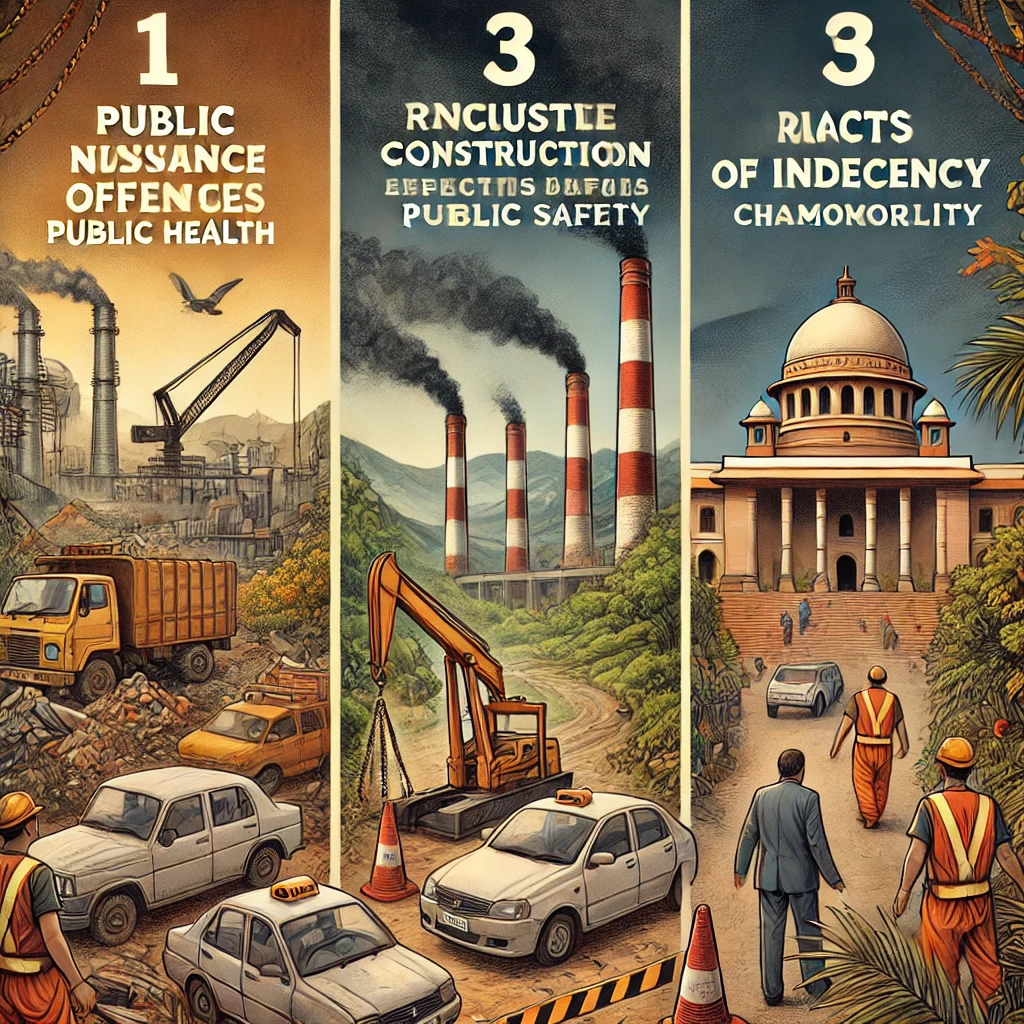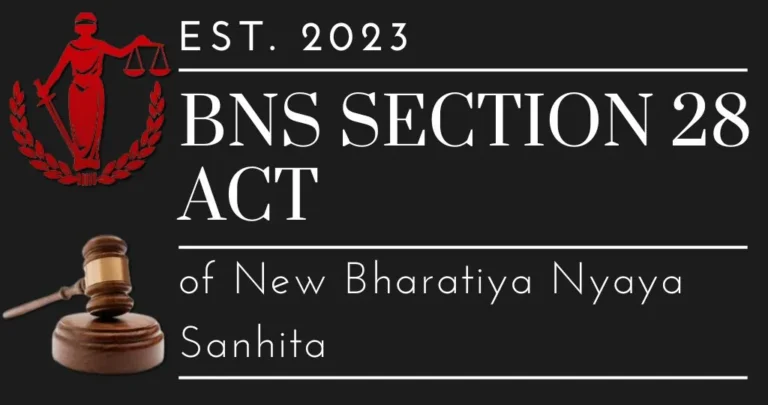
Public Nuisance Offenses in Bharatiya Nyaya Sanhita, 2023: Public Health, Safety, and Morality
Public Nuisance Offenses under Bharatiya Nyaya Sanhita, 2023: Public Health, Safety, and Morality
The Bharatiya Nyaya Sanhita, 2023, that substituted the Indian Penal Code and was effective from July 1, 2024, provides for different offenses affecting public health, safety, convenience, decency, and morals. Chapter XV of the Sanhita makes provisions regarding public nuisance, with actions or defaults constituting offenses affecting the wider community. Sections 270, 292, and 293 are specifically enacted to safeguard persons and communities against ordinary dangers, disturbances, and inconveniences likely to arise where public rights are invaded. This article clarifies each of these sections in plain language with illustrations to facilitate understanding of the legal provisions.
Section 270: Definition and Effects of Public Nuisance
For More Updates & Regular Notes Join Our Whats App Group (https://chat.whatsapp.com/DkucckgAEJbCtXwXr2yIt0) and Telegram Group ( https://t.me/legalmaestroeducators ) contact@legalmaestros.com.
Section 270 describes what a public nuisance is, which is any act or unlawful omission that occasions common injury, danger, or annoyance to the public or persons residing in the affected area. A public nuisance is when one’s conduct upsets the common good, disrupts peace, or impacts the health or safety of the surrounding people. Notably, although an act may offer some convenience or benefit, it is not justified if it becomes a public nuisance for everyone.
Examples of Public Nuisance Under Section 270
Uncontrolled Garbage Burning: If an individual constantly burns trash in an open field, emitting smoke and poisonous fumes, this is a public nuisance. The activity contaminates the air, impacts individuals’ health, and is hazardous for residents in the surrounding areas. Even if the individual asserts that burning trash is an easy way to dispose of it, the law does not exempt this since it injures the public.
Obstructing Roads or Passages: If a person builds temporary structures or erects obstructions that obstruct a public road or passage, it is a public nuisance. Individuals will be inconvenienced, and emergency vehicles may be delayed, posing a risk to those in need of immediate assistance. In this case, the law focuses on the fact that public rights, such as free passage, must not be violated for personal gain.
Unauthorized Loudspeakers: Blasting loud music on unauthorized loudspeakers, particularly during late hours, can become a public nuisance if it interferes with the peace of a community. The sleep and overall well-being of residents are disrupted, and such behavior would constitute a public nuisance under this provision.
Section 292: Punishment for Public Nuisance in General
Section 292 provides for the situation when a public nuisance is caused without mentioning special penalties in any other section of the Sanhita. Here, whoever commits an act amounting to public nuisance will be punished by a fine that does not exceed one thousand rupees. It is a default provision for an offense which cannot be placed under more particular headings but causes an inconvenience to the public.
Examples of Public Nuisance Punishable Under Section 292
Littering Trash on Public Streets: If an individual throws domestic trash in a public area, making the place stinky or inviting insects, it impacts the health and hygiene of the community. Here, even if there is no other law that specifically forbids it, the person can be penalized up to one thousand rupees for creating a public nuisance.
Allowing Pets to Roam Freely Unsupervised: If a pet owner lets their dog run freely without supervision and causes alarm or disturbance to the public, such conduct, which may result in potential harm or inconvenience, can be prosecuted under Section 292 despite other legislation not addressing it.
Section 292: Punishment for Public Nuisance on One or More Occasions
Section 293: Punishment for Public Nuisance Repeated or Continuously
Section 293 imposes harsher punishment on those who persist or repeat a public nuisance despite being ordered to desist by a lawful authority. If a public officer exercising a legal right, including a police or a municipal officer, orders someone to discontinue a nuisance and he or she fails to discontinue it, then the individual may be given simple imprisonment up to six months, a fine of up to five thousand rupees, or both. The importance of following instructions of a lawful nature where the action relates to public welfare has been underlined in this section.
Examples of Repeated Public Nuisance Under Section 293
Repeated Noise Offenses: If an individual is cautioned by the police for playing music loudly late at night but continues to play loudly, they might be subjected to harsher punishment under Section 293. The purpose of this section is to discourage repeated offenses against public peace and safety.
Disobedience of Orders to Desist from Illegal Parking: If a company keeps obstructing a public street by parking business vehicles in spite of being warned by the authorities, disobeying this order would not only be a continued annoyance but also a blatant disregard for legal orders, which is an offense under Section 293.
Running Polluting Units in Dwellings: If a tiny factory, emitting fumes or waste, is cautioned by officials to shut down in a dwelling area but fails to do so, the proprietors can be punished under Section 293. The legislation safeguards community health and safety above private convenience or profit.
Conclusion: Importance of Public Nuisance Provisions under Bharatiya Nyaya Sanhita
The provisions in the Bharatiya Nyaya Sanhita on public nuisance in Sections 270, 292, and 293 are important in maintaining public health, safety, and convenience. These sections provide that individuals and enterprises ensure they act responsibly in society and acknowledge their obligation to avoid causing harm to others. Public nuisance statutes are important because they give individuals a legal means to challenge activities that could otherwise disturb their lives or threaten their health. Studying these sections inspires citizens to consider the effects of their behaviors on public good and contribute to a more responsible and secure community for everyone.






